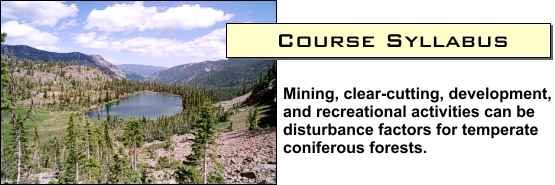 |
|
Professor Emeritus R. Robberecht College of Natural Resources | University of Idaho Moscow, Idaho 83844-1133 USA
Ecology@uidaho.edu
|
Quick index |
|
Restoration Ecology
(REM 440, 3 credits) |
Spring semesters The ecological restoration of disturbed ecosystems. Fundamental principles from ecology, ecophysiology, and community ecology are used in a systems ecology approach to examine how the structure and function of damaged ecosystems can be restored – with the goal of establishing a stable and self-sustaining ecosystem. Prerequisite: General ecology, or
permission |
|